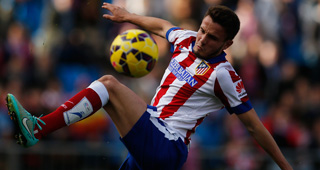On the continent, perception lags years behind reality. This isn’t anyone’s fault, really, though typical English and American chauvinism has something to do with it: most of what you hear about the big teams in Spain, Germany, and Italy—the ones who show up in the Champions League knockout stages each season—is based more on reputation than in reality. Barcelona’s attacking style was called tiki-taka long after Pep Guardiola was in Munich, and Xavi had turned to dust, and you can bet that any Italian side will be described as tactical as means of not having to know anything else about them. It’s no great sin, nobody can keep perfect tabs on all the soccer worth watching, but it sometimes produces an uncanny viewing experience. The announcers are talking about a team that exists in their notes and you’re seeing something else entirely. The “most lethal counterattack in Europe” seems to kind of suck tonight, Martin.
You’d be forgiven for not keeping up with Atlético Madrid too closely over the past few seasons. You haven’t missed any thrill that stubbing your toe against an uneven sidewalk tile doesn’t provide. They have, in the time it took for them to acquire, transform, and ultimately lose Antoine Griezmann, realized their destiny by becoming all the nasty but not strictly factual things people said about them when they were winning domestic titles and very narrowly missing out on major European ones.
Their matches are tedious and disjointed. After they get a lead, and sometimes even when the score is level, they drop deep into their own half and attack only through long balls and counters that stop dead near the halfway line because there’s nobody to pass to farther up the pitch. They have an aggravatingly limited set of offensive ideas and their creative players often appear more afraid of making a mistake than concerned with creating scoring opportunities. They’re a miserable, miserable side to behold, and they’ve been respectable in Spain mostly because their once historically great defense is still pretty good and they have considerably more talent at their disposal than Valencia, Sevilla, and the rest of La Liga’s bourgeoisie. If you’ve heard any buzz about fans wanting Diego Simeone to leave the club: it’s well-founded. The team’s been in decline for a long while, and he doesn’t seem to know what to make of any player, no matter how gifted, who isn’t a defender or a central midfielder.
In what was either a doubling or a tripling back on what they actually are versus what most people believe them to be, Atleti were impenetrable and opportunistic on Tuesday against Liverpool. They scored an early goal off a set piece, which they haven’t been effective from since 2015, soaked up pressure for long stretches, which they haven’t done reliably since 2016, and held probably the best team in Europe to zero attempts on goal. Mo Salah enjoyed little space on the right against Renan Lodi. Sadio Mané had to come off at halftime because he was frustrated by Sime Vrsaljko and on the brink of picking up a second yellow card. Thomas Partey put in a more effective and assured performance than any Reds midfielder. Liverpool dominated the ball and Atleti, as used to be their wont but sort of isn’t anymore, dominated the match. They were a couple missed chances from Alvaro Morata and Diego Costa away from a perfect performance.
Taking a one-goal lead into Anfield can rather quickly become like not having any advantage at all. Fondo Sur carried Atleti for stretches of Tuesday’s match, and the Kop will do the same for Liverpool in a few weeks. This is rudimentary analysis, but it’s going to be important for Simeone’s side to keep Mané, Salah, and [gestures toward the entire lineup] quiet early because there will be almost inevitably be a point in the match when Liverpool score or come close on a succession of promising opportunities, the crowd will awaken, and Atleti will be in hell until the final whistle rescues them. They might be able to survive half an hour of that. 70 minutes is likely asking too much.
Cristiano Ronaldo scored in the 27th minute of last season’s round of 16 tie against Atleti, and that was pretty much the end of the rojiblancos, who came to Turin with a two-goal advantage and a pathetic gameplan that cost them the tie. They packed bodies into the box and let Juve hit tens of uncontested crosses to Cristiano and Mario Manduzkic. Simeone figured he had already qualified for the quarterfinals after a successful home leg and all he had to do was wait Juve out. Naive is often used to describe teams that are too adventurous for their own going forward, but Cholo has a tendency to be naive in terms of what his players can withstand defensively. Like, he’ll just roll them out there and assume having 25 percent of possession won’t be a problem. This has at least as often as not been a self-defeating tactic, but against Europe’s elite, Cholo insists upon it.
Which is why Atleti’s reputation hasn’t changed even as they’ve become something quite different from what they were several years ago. One way you could put this is that they’re simply worse. When they appear to be their old selves is when they’re at their best, because the idea of what they could become—god forbid, a team that ever tried to do more than steal a single goal in big games—has stalled. They’ve got the edge over Liverpool, but they’re rarely as precise as they looked in their impressive first leg victory. The Reds are still favorites, because we know what they are. Atleti’s capacity to beat them on aggregate remains largely theoretical, informed mostly by the past and just barely evident in the present.



